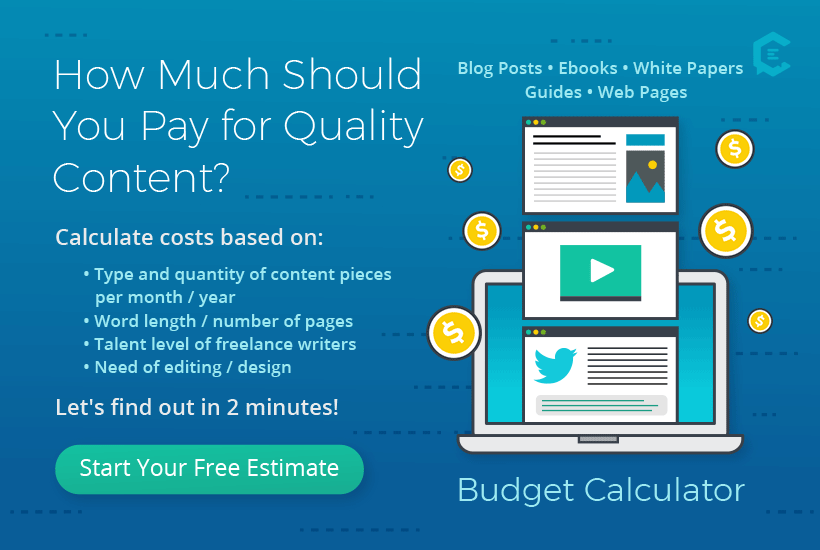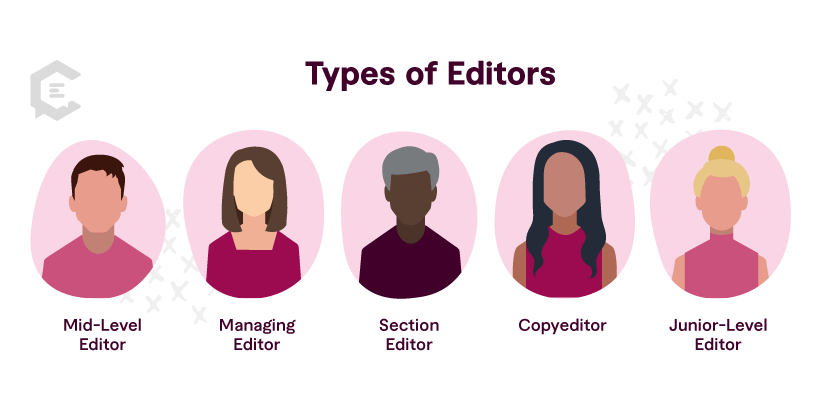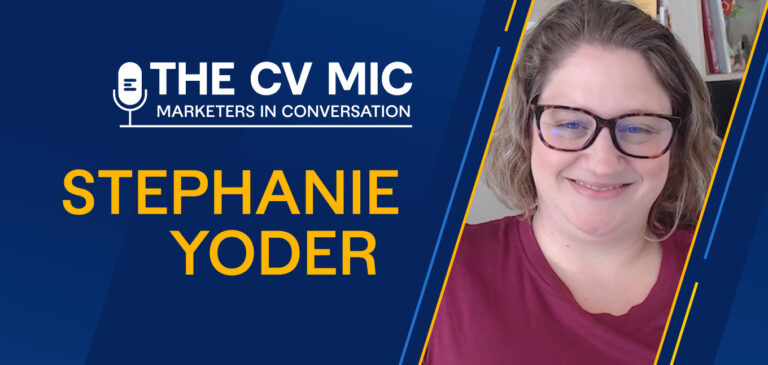The type of freelance editor you need depends on a variety of factors, including where you are in the writing process. At the various phases in the life of a piece of content, there are different editorial skills you can leverage to make your writing more compelling and credible.
When it comes to writing, editing can be almost as important as the actual pen-to-paper (or pixel-to-screen) process. A good editor can turn even an incoherent jumble of words into credible, comprehensible prose. But there are different types of editors, and the best one for you depends on a variety of factors. But rest assured, if your project has words in it, you need to hire an editor.
The first factor to consider is the type of project, which could be anything from your own book to marketing materials to a website. A freelance editor can significantly improve the final product in any of these situations.
The type of editor you need depends on multiple factors
While there are different types of editors to choose from, you should first consider your current status and needs. Ask yourself the following questions:
- Do you have a completed manuscript or just an idea you want to flesh out?
- Are you looking for the long-term growth of your blog, website, or one-off marketing campaign help?
- Is this your first time writing this kind of project?
- Do you want an editor to strategize topics and manage an editorial calendar?
- Is your project a rough draft?
- Will you need ongoing editorial support, or is this a project with a finite timeline?
Think about the status of your project as you review the different types of editors and editorial services.
5 types of editors
If your company is looking for long-term content creation, you’ll want to start by hiring an editor who can oversee the entire process. But since there are different types of editors, it helps to know what their roles are to ensure you get exactly what you need.
1. Mid-level editor
Companies creating a limited amount of content — say, two to three articles per week — might be able to get by with a mid-level editor who can both write and edit content, as well as assign the occasional piece and possibly manage some social media interaction.
2. Managing editor
For a more robust content flow, you’ll want to find a managing editor (ME), who will oversee the content strategy and ensure overall quality is maintained. This person can handle everything from managing copy editors to keeping your editorial calendar up to date.
3. Copy editors
Copy editors review each document for spelling, grammar, and punctuation errors. They can also ensure each piece features your brand’s voice and an appropriate tone for the topic. If you have a managing editor, they can also directly manage any freelance copy editors you hire.
4. Section editors
You can hire a section editor if you have enough content to warrant them. At a magazine, for example, the ME controls the style guide and editorial calendar (what content will be published when), which, in turn, determines what each section editor will publish. So if November is the big travel issue, the food section editor might publish content about the best hotel restaurants or the best foodie cities.
5. Junior-level editor
The ME rarely gets down and dirty with copy editing or interacting with new freelancers, although they might interact with some of the publication’s more seasoned writers. With an ME on board, the content flow can work similarly to that of a traditional publication, with content coming either from outside the company, such as through freelance writers, or from within, such as from junior-level editorial staff.
At a non-media company, the ME will also interact with other departments, such as the sales team, to determine content needs. You might, for example, develop a content strategy that highlights a different client or partner each month, which could help the sales team land new accounts.
6 types of editing
Now that you know the types of editors you can hire, let’s dig deeper. Here are six different types of editing, and how they differ.
1. Developmental editing
For ideas that are still in the rough stages, a developmental editor can help bring structure and organization to the project, whether it’s fiction or nonfiction. Perhaps your company is looking to update its website or begin a blog — a developmental editor can help decide on the site hierarchy, blog categories, and the overall voice and tone. (For online projects, look for an editor who also has at least some knowledge of SEO and/or user interface (UI) design.)
If your CEO has an idea for a groundbreaking business book but doesn’t know where to begin, a developmental editor can help break down the topic into digestible chunks that can be easier to tackle than a full-on tome. When it comes to books, the developmental editor is often part of the project from conception to conclusion.
2. Manuscript evaluation
This service is exactly what it sounds like: A seasoned editor provides feedback on your work. For those with a completed project, a manuscript evaluation can give you a better idea of your next steps. If the overall critique is glowing, you may only need a proofreader to review your work before it’s published, whether that be online or in print.
But if your project needs more work than that, the evaluation should tell you what steps you should take to get it to a publishable state, such as going back to square one and having a developmental editor work it over, or hiring a line editor to help with voice and tone.
3. Line editing
Think of line editing as a line-by-line review instead of the grand overview of the manuscript critique. During the line editing process, the editor looks for flow, tone, and clarity, and will point out problems such as run-on sentences, clichés, and pacing.
Although punctuation and grammar are not the focus of a line edit, many editors can’t help themselves and so will do both at the same time. Just keep in mind that you’ll still likely need a copy editor after a line edit.
4. Copy editing
Even within the editing world, there’s some disagreement as to how copy editing differs from proofreading, so be sure to clarify how an editor defines the service before you begin working together. At magazines and many websites, a copy editor reviews content for punctuation, grammar, spelling, and the project’s unique “style,” or rules specific to that project/publication.
The two most commonly used styles in media are Chicago Manual and AP (Associated Press), although there are others specific to individual industries (e.g., many medical journals follow American Psychological Association, or APA, style).
Style guides are why you see such revered institutions as the New York Times and The New Yorker spelling it “cooperate” and “coöperate” — each has its unique style guide, created and added to over the years. Your copy editor needs to be familiar with your project’s style, or at least be given a document outlining your brand’s peculiarities and preferences. Hire a copy editor to keep it all in check.
5. Proofreading
Some would argue this is the same as copy editing — and in some ways, it is. The term refers to the hard-copy process where a “proof” — a test print of a book, newspaper, or other print publication that has been laid out, graphics and all — is given a final review before the project goes to print. However, it also applies to online projects, from blog posts and ebooks to social media posts and email marketing campaigns.
So in a sense, the proofreading stage is your last chance to catch all those misplaced apostrophes, typos, and missing serial commas before the project is put to paper and is, thus, unchangeable. In addition to copy editing skills, a good proofreader also has an eye for layout issues, such as unintentional extra spaces, missing bylines, or misnumbered pages.
The proofreading process is not the time for major revisions or anything larger than correcting an actual physical error. Because of the print-focused nature of proofreading, few online publications have bona fide proofreaders; the editorial process is considered complete once the content has been copy edited and is live on the site. But you’ll still hear web editors asking for copy to be “proofread,” which in that context is pretty much the same as copy-edited.
6. Book shepherding
Although this isn’t an official term, this role has become more popular in recent years. With self-publishing enjoying increasing popularity — and with costs now so low you might be surprised how affordable it is to print a quality copy of that high school novel you’ve had stuffed away in a drawer — book shepherds have taken on the role of guiding newbies through the publication process.
Although a book shepherd may not be an editor in the traditional sense of the word, many long-time editors have since taken on this role, in addition to the copy editing, line editing, and/or developmental editing they started out doing. Since a book shepherd is also likely to fill one of these roles, if you’re publishing a book, you may as well try to find someone who can do both. You just need to know to ask.
Book shepherds can be just as important as editors when it comes to self-publishing, helping you with everything from getting an ISBN (or even explaining what that is) to helping with interior layout, front matter, and all the other things you didn’t know you needed to make your book shine. Plus, they help ensure that your finished hard copy is as professional-looking as possible, with the right cover, binding, and quality paper for what your budget can afford.
Other editorial services
Few companies realize just how much they need editorial guidance until they have it — and then they wonder how they ever lived without it. So consider other ways your editorial staff can help with related tasks outside of their department, such as copy editing one-sheets for sales or proofreading ads for the design team. Such pitching-in could help prevent embarrassing typos, costly reprints, and lost trust with your target audience.
Another editorial service that’s all the rage is assisting businesses and busy execs with writing books to help boost their profiles or brand messaging. Depending on how much you’re able to write yourself, you may only need line editing, copy editing, or one of the other editing services mentioned above. But if you need more help than that, consider a ghostwriter, who can take the bulk of the work off your plate.
What type of editor does your company need?
By now, you should have a better idea of what types of editors or editorial services your business needs, whether you’re in the home and garden, finance, or software niche. With the rise of content marketing, brands have increasingly needed editors and writers. Depending on the amount and type of content your company is creating, you may need one or more editors, whether they are full-time staff or outside contractors.
Elevate your content marketing with editors
Few companies will require an editorial staff that rivals a traditional magazine, but several well-known brands are making that strategy work for them. REI’s blog produces outdoor travel content to rival some of the top magazines in the biz. HomeDepot’s blog provides detailed how-to guides that range from simple gardening projects to complex electrical work. Rosetta Stone’s blog offers advice for learning a new language, information on other cultures, and tips for getting the most out of their products.
In the above cases, content marketing serves to cement brand messaging, attract new customers, boost sales, and increase online exposure and credibility. (And the editors are behind the scenes, ensuring it all goes off without a hitch — or a typo.)
While these examples are of large businesses, small- and medium-sized companies can follow their lead, albeit on a smaller scale, with freelance editors who can meticulously edit everything from blog posts and web content to white papers and paid ad copy.









